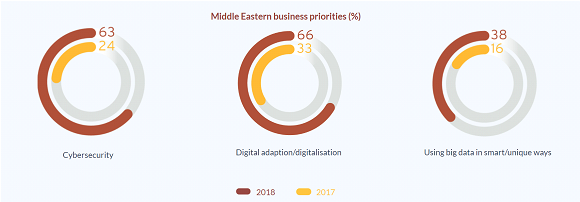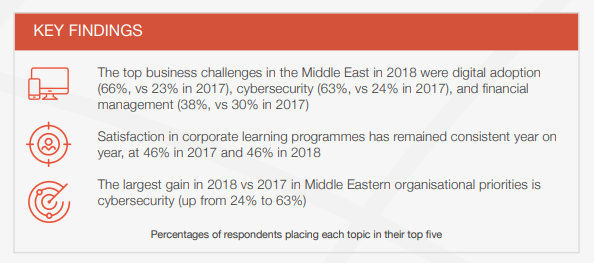Digital adoption and cybersecurity are the top challenges for Middle Eastern businesses, survey finds
Dubai, UAE, 15 July 2019: Sixty-six percent of senior executives in the Middle East believe digital adoption and cybersecurity are their greatest business challenges, an international survey of businesspeople working across the Middle East reveals.
According to the Pulse Report commissioned by Headspring, the executive development joint venture of the Financial Times and IE Business School, concerns around digital adoption and cybersecurity have increased significantly in the past two years. In a similar survey conducted in 2017, just a quarter of the managers agreed that these issues were at the top of their list of concerns.
The Pulse Report is a study of management attitudes to leadership development and executive education. The Middle East edition, launched in partnership with the Dubai International Financial Centre (DIFC), is part of a wider international survey also covering Western Europe and Japan.
Gustaf Nordbäck, CEO of Headspring, said: “The Pulse Report takes stock of the shifting learning needs of businesses, reflecting the views of C-suite executives, senior business leaders, human resources executives, and learning and development leaders.
“The report shines a spotlight on Middle East findings. In many respects, the business priorities and learning needs of the region are not dissimilar from the global position. Businesspeople are understandably preoccupied with digital issues the world over. However, alongside cybersecurity and digitalisation, our findings also show that the Middle East has not lost sight of the importance of financial management,” continued Nordbäck.

Key findings
The top business challenges in the Middle East in this latest survey, versus the previous report conducted in 2017, are (percentages of respondents placing the issues in their top five concerns):
⦁ Digital adoption: 66% (vs 23% in 2017)
⦁ Cybersecurity: 63% (vs 24% in 2017)
⦁ Financial management: 38% (vs 30% in 2017)
The report also considers how leadership development can have an influence in addressing these key business challenges. Asked about their attitudes to executive education as a business priority, 30% of Middle East respondents placed it in their top five issues to be addressed.

Commenting on the report, Alya AlZarouni, Executive Vice President of Operations, DIFC Authority, said: “Growing business in today’s world is no longer driven by generating revenue, it is very much about harnessing the right talent and developing human capital within an organisation. Deepening the pool of financial services professionals in the region remains a key priority for us at the DIFC. We continue to promote excellence and professional development through a number of knowledge-sharing initiatives and offering executive education courses on our growing network of leading academic institutions, such as Headspring, at the DIFC Academy.”
“We are pleased to have partnered with Headspring on the Middle East edition of Pulse Report, which reflects the significant emphasis that regional companies put on upskilling and training their people. An impressive number of Middle Eastern business leaders agree that executive education is a vital part of the region’s economic transformation and sustainability in constantly evolving market environment,” continued AlZarouni.
Talent Management: growing skills
Although growing leaders is not noted as a top priority for Middle Eastern senior professionals, they do expect their executive education programmes to deliver results. Expected internal outcomes of such programmes include individuals gaining skills to lead and manage teams (54% of respondents citing it as a top concern) and improved employee engagement scores (62%).
With the future in mind, three in five Middle Eastern business leaders agree that new ways of thinking and problem solving are encouraged in their organisation (62%), highlighting how ready they are to thrive in an innovative landscape. In addition, 57% agree that they are well-prepared to adapt to new technologies.
Bassem Banna, Headspring’s Vice President of Corporate Partnerships for the Middle East, said: “The region is undergoing a significant economic transformation, changing from resource-dependent into a knowledge-based economy. With high numbers of the younger generation entering the workforce in the GCC, millennials will soon occupy senior leadership positions in government, and in private companies in many business sectors.”
Executive education as future-proofing
The greatest priorities for Middle Eastern business leaders when it comes to executive education needs are cultural change (59%), creating a culture of innovation (55%) and adopting new technologies (55%).
These, along with the issues of talent management and helping employees advance their careers in order to drive growth, are as pressing as ever, especially considering that 78% of Middle East business leaders agree that executive education is vital to achieving business goals.
The full Pulse Report Middle East edition is available as a download from https://go.headspringexecutive.com/pulsemiddleeast
About Headspring
Headspring empowers organisations to embrace change and inspire a culture of continuous learning. It achieves transformational results by working in partnership with organisations globally to co-create bespoke, future-focused learning designs that empower people, develop leaders and enhance the strengths of businesses. It designs and delivers customised education and leadership programmes, taking the business acumen, academic rigour and innovative approach of IE Business School and a global network of expert educators, adding the perspectives and skills of the most influential Financial Times journalists.
Headspring was originally formed in 2015 by the Financial Times and IE Business School as the Corporate Learning Alliance.
Visit headspringexecutive.com
Twitter: @goheadspring | LinkedIn | Facebook | YouTube
About Dubai International Financial Centre
Dubai International Financial Centre (DIFC) is one of the world’s most advanced financial centres, and the leading financial hub for the Middle East, Africa and South Asia (MEASA), which comprises 72 countries with an approximate population of 3 billion and a nominal GDP of USD 7.7 trillion.
With a 15-year track record of facilitating trade and investment flows across the MEASA region, the Centre connects these fast-growing markets with the economies of Asia, Europe and the Americas through Dubai.
DIFC is home to an internationally recognised, independent regulator and a proven judicial system with an English common law framework, as well as the region’s largest financial ecosystem of over 24,000 professionals working across over 2,100 active registered companies – making up the largest and most diverse pool of industry talent in the region.
The Centre’s vision is to drive the future of finance. Today, it offers one of the region’s most comprehensive FinTech and venture capital environments, including cost-effective licensing solutions, fit-for-purpose regulation, innovative accelerator programmes, and funding for growth-stage start-ups.
Comprising a variety of world-renowned retail and dining venues, a dynamic art and culture scene, residential apartments, hotels and public spaces, DIFC continues to be one of Dubai’s most sought-after business and lifestyle destinations.
For further information, please visit difc.ae, or follow on Twitter @DIFC.